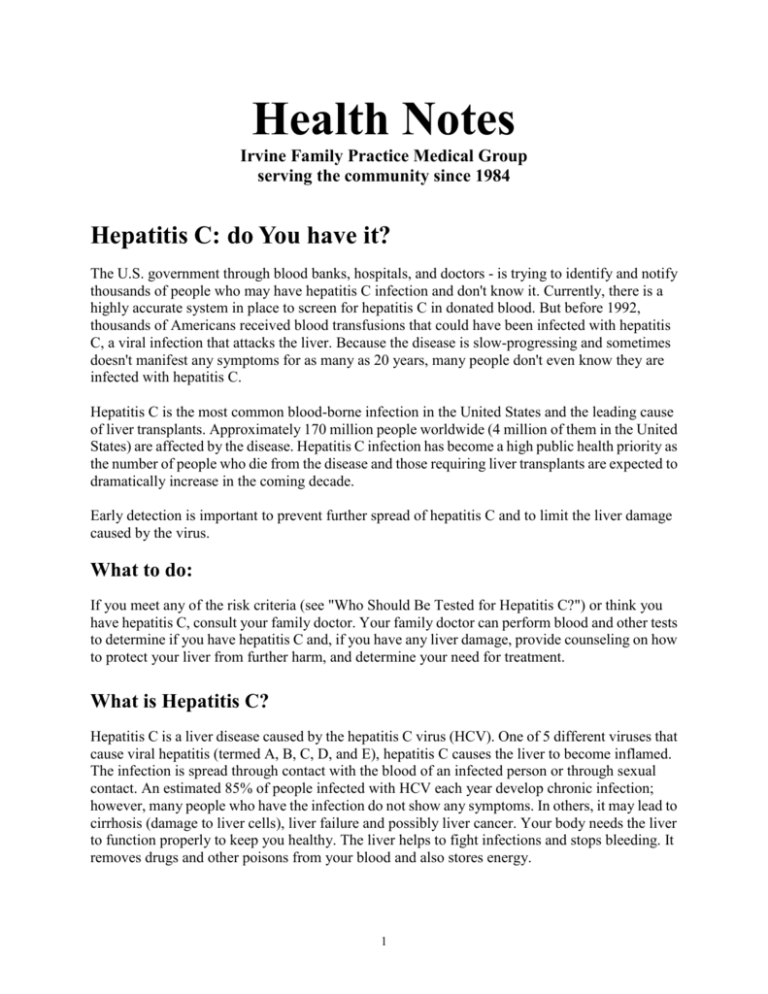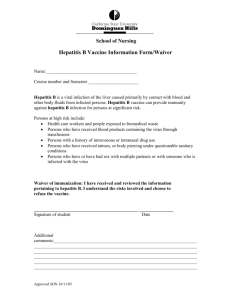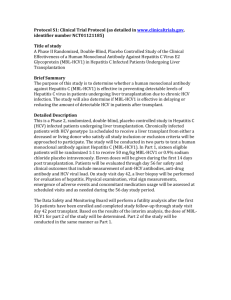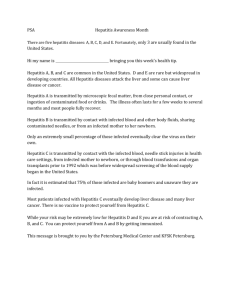5. Hepatitis C - Irvine Family Practice Medical Group
advertisement

Health Notes Irvine Family Practice Medical Group serving the community since 1984 Hepatitis C: do You have it? The U.S. government through blood banks, hospitals, and doctors - is trying to identify and notify thousands of people who may have hepatitis C infection and don't know it. Currently, there is a highly accurate system in place to screen for hepatitis C in donated blood. But before 1992, thousands of Americans received blood transfusions that could have been infected with hepatitis C, a viral infection that attacks the liver. Because the disease is slow-progressing and sometimes doesn't manifest any symptoms for as many as 20 years, many people don't even know they are infected with hepatitis C. Hepatitis C is the most common blood-borne infection in the United States and the leading cause of liver transplants. Approximately 170 million people worldwide (4 million of them in the United States) are affected by the disease. Hepatitis C infection has become a high public health priority as the number of people who die from the disease and those requiring liver transplants are expected to dramatically increase in the coming decade. Early detection is important to prevent further spread of hepatitis C and to limit the liver damage caused by the virus. What to do: If you meet any of the risk criteria (see "Who Should Be Tested for Hepatitis C?") or think you have hepatitis C, consult your family doctor. Your family doctor can perform blood and other tests to determine if you have hepatitis C and, if you have any liver damage, provide counseling on how to protect your liver from further harm, and determine your need for treatment. What is Hepatitis C? Hepatitis C is a liver disease caused by the hepatitis C virus (HCV). One of 5 different viruses that cause viral hepatitis (termed A, B, C, D, and E), hepatitis C causes the liver to become inflamed. The infection is spread through contact with the blood of an infected person or through sexual contact. An estimated 85% of people infected with HCV each year develop chronic infection; however, many people who have the infection do not show any symptoms. In others, it may lead to cirrhosis (damage to liver cells), liver failure and possibly liver cancer. Your body needs the liver to function properly to keep you healthy. The liver helps to fight infections and stops bleeding. It removes drugs and other poisons from your blood and also stores energy. 1 Who should be tested for Hepatitis C? 1. People who had blood transfusions or solid organ transplants before July 1992, who were treated for clotting problems with a blood product made before 1987, or have ever been on long-term kidney dialysis. 2. Patients who have frequent exposure to blood products, such as those with chronic renal failure, hemophilia or cancers requiring chemotherapy; however, recent exposure is not a risk. Please consult your family doctor if you feel you fall into this category. Health care workers with a known exposure to HCV-positive blood. Injection drug users and former injection drug users. Children born to HCV-positive women. How to protect yourself: Don't share needles, toothbrushes, razors, or other items that may have blood on them. Wear gloves when touching anyone's blood. If you're sexually active, practice safe sex and use condoms. If you get a tattoo or body piercing, make sure that the tools are sterile. If you have hepatitis C, don't donate blood or plasma. If you have hepatitis C, don't drink excessive amounts of alcohol. For more information: American Liver Foundation 888/4-HEP-ABC or http://www.liverfoundation.org/ Centers for Disease Control and Prevention Hepatitis Branch 888/4-HEP-CDC or http://www.cdc.gov/ncidod/ National Institute of Diabetes and Digestive and Kidney Diseases National Digestive Diseases Information Clearinghouse 2 Information Way Bethesda, MD 20892-3570 or http://www.niddk.nih.gov/ 2







